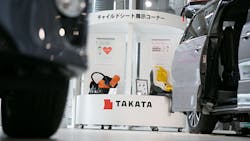Takata’s Founding Clan Takes $2.7 Billion Crisis Hit
Behind the bankruptcy of Takata Corp., the Japanese auto parts maker derailed by vast its airbag recalls, is yet another downfall — that of the company’s founding Takada family, one of the country’s more prominent business dynasties.
Takata filed for bankruptcy protection in the U.S. and Japan on Monday and also announced plans to sell most of its auto safety products business for nearly $1.6 billion to Chinese-owned American rival, Key Safety Systems Inc. The moves are the latest twist in a decade-long drama that saw Takata’s faulty airbag inflators linked to at least 17 deaths and be at the center of the auto industry’s largest recall. Takata has said it still hasn’t identified the cause of the airbag failures.
The whole episode has enraged investors and cast an unflattering spotlight on Takata chairman and CEO Shigehisa Takada, the third-generation head of the family business, who had pushed hard to do a debt restructuring outside of bankruptcy court. The scandal has also resulted in a $2.7 billion hit to the Takada family, which controls about 60% of the company’s shares.
Takata has lost almost all of its market value from its 2007 peak of 400 billion yen ($3.57 billion). The value of the family’s stake has plummeted from more than 300 billion yen ($2.68 billion) to less than 2 billion yen ($17.85 million) and it could go to zero given the $10 billion in potential recall costs of the airbag business, which will stay with the surviving part of Takata rather than move to Key Safety Systems. The Takada family also used to collect more than 1 billion yen ($8.93 million) in dividends a year before the payouts were stopped in 2014 with the escalating crisis.
“Takata is in a situation where there’s a risk of excessive debt, as a result of the recall expenses,” said Tatsuya Ikeda, an attorney with Tokyo-based Adire Legal Professional Corporation. “In a situation where debt exceeds the assets, generally the stock will be treated as worthless. Takata shares are close to worthless already.”
At a shareholder meeting on Tuesday, its last as a listed company, investors ripped into the Takada family’s slow response to the airbag crisis and subsequent recalls. ”If the founding family had somehow reacted earlier, the handling of the crisis would have been absolutely different,” said Seiji Kitada, a 48-year-old investor from Osaka. “It’s hard to find what ability Shigehisa has to operate a technical company.”
Kenichi Asahi, 36, faulted management for failing to convince Key Safety Systems and Takata’s auto company customers to help keep it out of bankruptcy. “I have pumped in considerable amounts of money into Takata stock, probably several millions of yen,” he said. “That stock will soon become paper trash.”
Shigehisa joined Takata right after graduating from Keio University in 1988, and succeeded his father, Juichiro, as CEO in 2007 at the age of 41. He hired Stefan Stocker, former president of the Japanese arm of the German auto parts maker Bosch Corp., as his successor in 2013, while staying on as chairman. But Stocker left the company after 18 months and Shigehisa returned to the helm.
As the airbag crisis unfolded and numerous recalls followed, he apologized in written statements and newspaper ads. When the company was called to testify before Congress in the U.S., he dispatched deputies. Takada didn’t make his first public apology until June 25, 2015, after the annual shareholder meeting. “The company that should be offering the safety to the users ended up hurting them,” he said then. “It grieves me most deeply.”
Takada might have also misread the patience of Takata’s biggest lenders. At the shareholder’s meeting, Takada said the company’s lenders at first had been patient as the company explored a debt restructuring with suppliers and banks that would have been negotiated quietly. That hope vanished after media reports speculated that Takata was heading into bankruptcy, he said. “Unfortunately our current situation has become very precarious,” said Takada.
Things really started to unravel when the Nikkei reported June 16 that Takata, under pressure from its major auto company customers, would file for bankruptcy. Auto executives preferred that negotiations over outstanding debts be conducted publicly and more transparently for their shareholders, according to Takada.
That appeared to be a tipping point, according to Takada’s comments at the shareholder meeting. “Unfortunately, at that time some media reports came out and the financial institutions couldn’t wait any longer,” he said.
All of this is a long way from the company’s glory days. In 1960, Takata diversified beyond its roots in textiles and began manufacturing seat belts for Japan’s carmakers, which were leading the country’s industrial expansion. Takata was the only company whose seat belts passed the U.S. National Highway Traffic Safety Administration (NHTSA) crash test standards in 1973.
A few years later, Honda asked Takata to look into manufacturing airbags. The automaker had a small stake in its supplier, and they worked closely together. Takata thrived and became a leader in auto safety systems that served overseas clients such as Ford Motor Co., BMW AG and Fiat Chrysler Automobiles NV.
During Takata’s run of prosperity, employees reverentially referred to Juichiro Takada, who then ran the company and passed away in 2011, as “emperor.” His wife, Akiko, resigned from day-to-day business operations in 2005. She’s still listed as one of the biggest individual shareholders of the company.
Now 77, the elegant family matriarch, who talked to a reporter in front of her apartment building in a upscale part of Tokyo, said that she feels “heart-wrenching” sorrow for the company’s failure: “We have been working on developing seat belts and airbags with an aim of zero traffic accident casualties,” she said. “As a founder of the company, I am deeply sorry for all shareholders as we filed for bankruptcy.”
By Ma Jie, Emi Nobuhiro and Masatsugu Horie, with assistance from Takako Taniguchi.
About the Author
Bloomberg
Licensed content from Bloomberg, copyright 2016.
